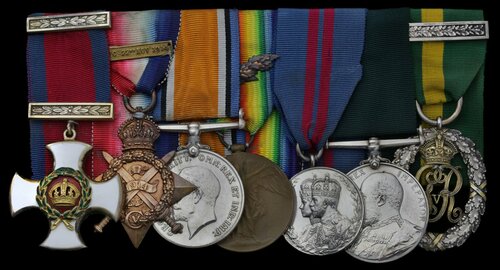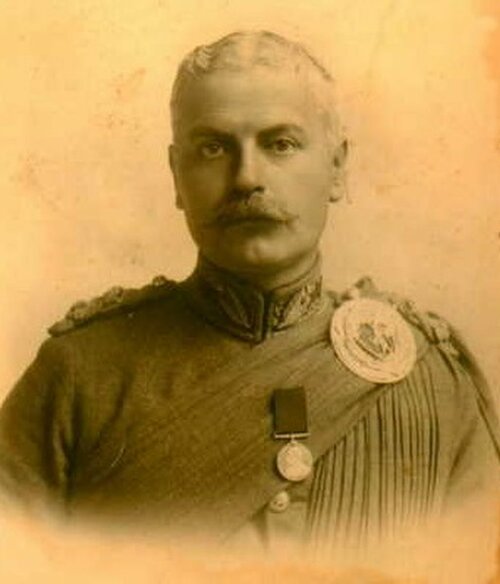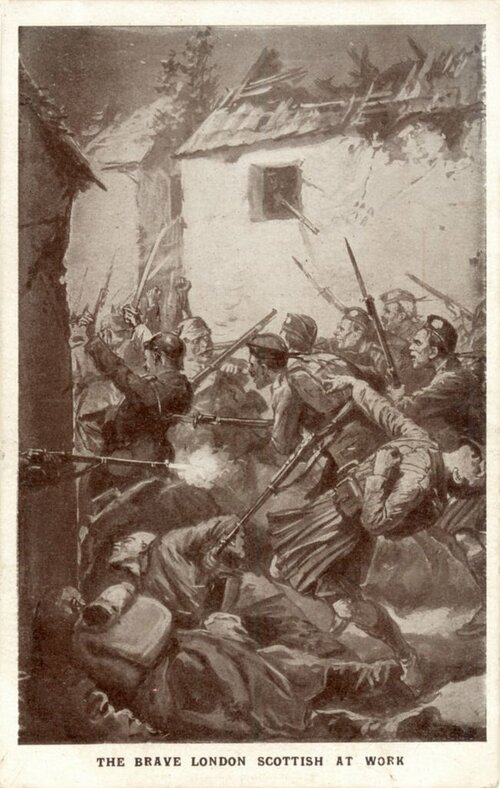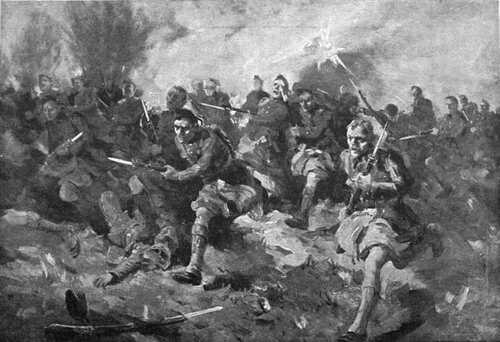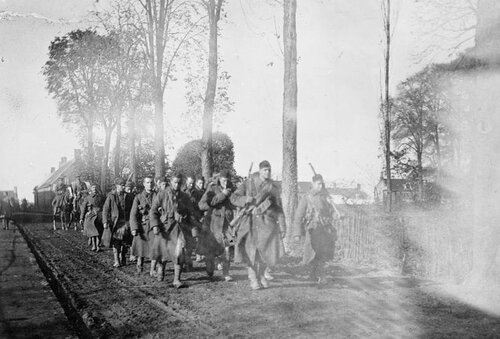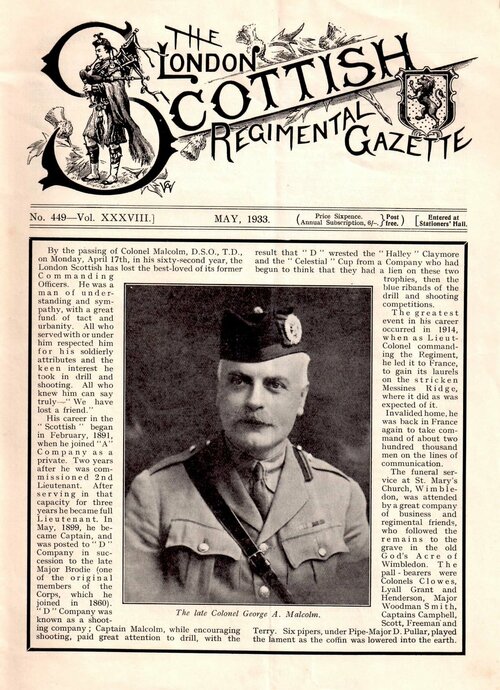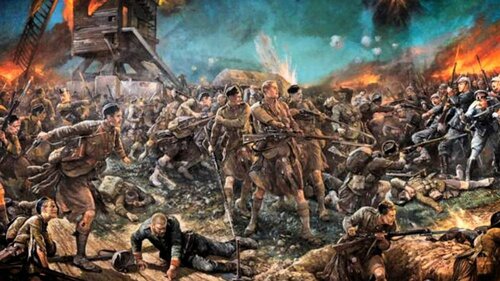Auction: 21001 - Orders, Decorations and Medals (conducted behind closed doors)
Lot: 378
Sold by Order of a Direct Descendant
The superb Great War D.S.O. group seven awarded to Colonel G. A. Malcolm, 1/14th Battalion, London Regiment (London Scottish)
A long-served member of this crack Territorial unit, Malcolm rose to its command and led his men with supreme bravery in action in 1914, most notably on 31 October 1914 on Messines Ridge - they were the first Territorial unit of the British Army to see action - and earned high acclaim when standing firm at a pivotal moment in the campaign
Malcolm personally led a bayonet charge at 'Brown Road Wood', Zillebeke, on 11 November before being invalided home; recovered, he returned to the fold and rose to be Assistant Director of Labour in France
Distinguished Service Order, G.V.R., with top riband bar adapted for mounting; 1914 Star, with copy clasp (Lt: Col: G. A. Malcolm. 14/Lond: R.), minor official correction to '14'; British War and Victory Medals (Col. G. A. Malcolm.); Coronation 1911; Volunteer Force Long Service, E.VII.R. (Major G. A. Malcolm. 7/Middx V.R.C.); Territorial Decoration, G.V.R., silver and silver-gilt, hallmarks for London 1913, with integral top riband bar, adapted for mounting, mounted court-style as worn, good very fine, housed in fitted Goldsmiths & Silversmiths, London leather case (7)
D.S.O. London Gazette 1 January 1918.
George Alexander Malcolm was born at Islington, London in 1871, son of James Robert Malcolm, a member of the famous London shippers Malcolm & Co. He enjoyed a lifetime of service with the London Scottish, commencing when he joined 'A' Company in February 1891. Some two years later he was commissioned 2nd Lieutenant, being advanced Lieutenant in 1895. Posted to 'D' Company and advanced Captain in 1899, in succession to the late Major Brodie, who had been an original member of the Corps and who had joined upon its formation in 1860 (The London Scottish Gazette, May 1933, refers). Under his careful eye, 'D' Company won the 'Halley' Claymore and 'Celestial' Cup, besides taking numerous prizes in various shooting and drill competitions.
Malcolm was made a Partner in the family firm in 1904, enthusing numerous members of his staff to join his Territorial unit, which was rightly considered the finest in all of London (The Tatler, 25 November 1914).
His finest hour came in the heat of action upon the outbreak of the Great War in 1914. Malcolm famously commanded his unit, the 1/14th Battalion, London Regiment (London Scottish), into the cauldron of Messines Ridge, 31 October 1914, therefore becoming the first Territorial unit to see action during the Great War. Having landed in France on 16 September 1914 the London Scottish, decked out in their Hodden Grey kilts, initially saw service in the lines of communication. This all changed as the British positions began to fold in late October with the gallant Malcolm - aged 43 - at their head.
Messines Ridge - Halloween 1914
Packed into thirty-four London buses, the unit arrived at Ypres at 0300hrs on 29 October 1914 (with Sir Douglas Haig and Colonel Malcolm sharing a bus); they had a brief rest and breakfast before marching on to Gheluvelt to build trenches. After a hard day's work the Battalion marched back to Ypres for rest - however, this anticipation was to be short-lived. When they arrived at the Cloth Hall, more buses were waiting to take them on to another destination - Armentières - where they were to support the 2nd Division Cavalry at St Eloi. Again they began the day by digging trenches but at 0800hrs received new orders. They calmly set off for Messines Ridge where a dangerous opening had been forced in the line by the enemy.
The task handed to Malcolm and those under his charge was to reinforce the Allied line and close the opening near what were known as Hun's Farm and Middle Farm. At the time Messines Ridge was occupied by the British infantry, which was under constant heavy artillery fire. On two occasions the London Scottish not only halted German attacks but forced the Germans back from the ridge, despite the fact that the Scots themselves were in an open position and faced with an overwhelming numerical disadvantage. A third attack saw the German troops break through their staunch defences, leaving the Battalion with heavy casualties and cut-off from Headquarters. To avoid total destruction of the Battalion, orders were given for a retreat towards Wulvergem. German forces had also suffered severe losses on account of the fierce rearguard put up by Malcolm's men, however, and were unable to deliver the final blow. Later in the day the Battalion regrouped at Kemmel and marched onto the Clytte.
Despite taking some 394 casualties, the action had written the men of the London Scottish into history: they had been the first of the Territorials to see action, proving the worth and ability of such formations. A memorial was laid on the Ridge and is a focal point of commemorations each year for the unit. Their Regimental History sums up the events:
'The London Scottish, hastily assembled from detached duties a few days before, with no preparatory training, with defective rifles and without their machine-guns, had been flung into one of the most desperate fights of the War. At a most critical moment they had held back the rush of overwhelming numbers long enough to prevent a break through that would have imperilled the whole position about Ypres. They had borne themselves well.'
Sir John French came out to Wulverghem to greet the survivors as they came in on 1 November. Malcolm soonafter had letters from a plethora of Senior Commanders:
Sir John French
'I wish you and your splendid Regiment to accept my warmest congratulations for the fine work you did yesterday at Messines. You have given a glorious lead and example to all Territorial troops who are going to fight in France.'
General Allenby
'...I wish to add my sincere thanks, and those of the Cavalry Corps, for the self-sacrificing support you gave in a great emergency. The behaviour of officers and men of the London Scottish was worthy of the best traditions of British Regular Troops. Only their steadiness and courage saved a situation that was as difficult and critical to deal with as we will ever occur.'
Brigadier-General Bingham
'I venture to ask you to convey to your Regiment my deepest gratitude and admiration for the work they performed on October 31, and through the following night. No troops in the world could have carried out their orders better, and while deploring the losses you have incurred, I unhesitatingly affirm that the Allied Armies in France owe the London Scottish a place of high honour amongst their heroes.'
Having gone to billets near Bailleul, Malcolm reported on the defective nature of the rifles his men had taken into action and was consequently ordered to take the rifles of the wounded in local hospitals. Wrongly assuming they would be reinforced with a draft from the 2nd Battalion in England, they were sent back to the front on 4 November, posted to Bellewaarde Farm, Hooge. Directed to join the 1st Guards Brigade at Ghulevelt, they were at the last moment sent to the 4th Guards Brigade in the woods near Klein Zillebeke, put into the line on the front-south side of the Menin Road at 'Brown Road Wood'. The Germans began to attack on 6 November, with Malcolm and his men finding no cover, amongst constant shell fire that showered them with sheared branches and chunks of wood which flew about upon shells bursting around them. When travelling from London, the unit had brought the two Vickers guns - private property of the unit and the only examples of this 'modern' weapon in France - which were knocked out on 11 November 1914, with Lieutenant Ker-Gulland being killed in the process. The attack rose to fever pitch that day, the enemy pouring into the woods and enveloping 'H' Company. Malcolm himself led a counter-attack from Battalion HQ with the remnants of the 60th Rifles. They were finally pulled out of the line.
Marched to Pradelles on 15 November, the survivors were in a state of great disrepair, many marching without shoes and bearded, not having shaved in well over a week. Malcolm had performed superbly throughout, being calm and able, leading his men from the front with the utmost bravery. He was taken ill and invalided from the front soonafter, with command devolving upon Major Sandilands of the Cameron Highlanders.
Recovered, he eventually returned to France in 1916 and was appointed Assistant Director of Labour at HQ, Labour Corps, with some 200,000 men under his charge. He finished the War with his richly-deserved D.S.O. and a 'mention' (London Gazette 11 December 1917, refers) to go with his T.D. and Volunteer Long Service Medal. His 1914 Star Trio was issued to him at home at Deepdale, Colonne Road, Wimbledon in September 1920.
He was made Senior Partner in the family firm in 1919 and Chairman and Managing Director, shortly before his death. Wm. F. Malcolm & Co - The First 75 Years gives the following account:
'His life was undoubtedly shortened by the service privations which he suffered during the 1914-18 War...He was the probably one of the best liked and most popular men in the London jute trade. He combined a charming personality with an exceptionally generous, open-handed disposition. Few, if any, in need or trouble, solicited his help in vain...With complete disregard of his own life he personally led his men into action and inspired them to deeds of heroism.'
The Colonel died on 17 April 1933 and the unit lamented that they '...had lost the best-loved formed Commanding Officer.' His memorial service at St. Mary's, Wimbledon was full of friends from the City and comrades from the London Scottish. His pallbearers were eight Officers of his beloved unit who carried him for burial in God's Acre of Wimbledon, with six Pipers, under Pipe-Major Pullar in full flow as he was lowered into the earth.
Each year, the Regiment commemorate the events of 31 October 1914: a vast celebration was held in 2014, with Regimental Colonel Alastair Bruce taking the salute outside St Columba's Church in London's Pont Street. The Pipes and Drums lead the Company home to Horseferry Road, much as they did in Belgium and France 107 years ago.
Sold together with the following original archive:
(i)
Bestowal document for the Distinguished Service Order, dated 1 January 1918, together with a copy of the Statutes of the Order and in named postage envelope.
(ii)
Original M.I.D. certificate, named 'Lt.-Col. G. A. Malcolm, T.D., T.F., Res.' and dated 7 November 1917.
(iii)
Two engraved silver identity tags, one for the wrist and one for neck wear, engraved 'G. Malcolm 26 Calonne Rd. Wimbledon' and 'Lt. Col. G. A. Malcolm. London Scottish.'
(iv)
London Scottish Rifle Volunteers, Commemorative Dinner Programme for March 1908, together with letter upon the disbandment of 'A' Company, in March 1896 and cloth map showing their March from Oban to Glasgow, from 13-19 March and totalling some 108.5 miles.
(v)
Copy of Evening Standard, dated 11 November 1918 and declaring the end of the Great War.
https://news.sky.com/story/remembering-first-reservists-to-fight-in-wwi-10383233
Subject to 20% VAT on Buyer’s Premium. For more information please view Terms and Conditions for Buyers.
Sold for
£6,000
Starting price
£1400

